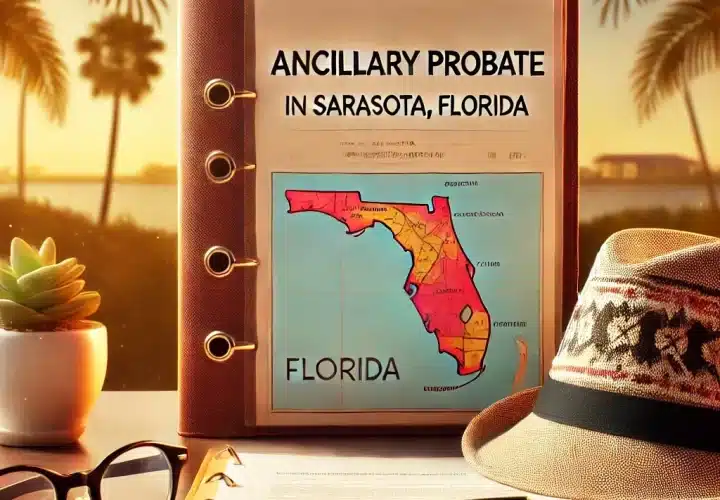If you own property in more than one state, including Florida, you may face the prospect of ancillary probate when you pass away. Ancillary probate is the legal process required to transfer ownership of out-of-state assets to beneficiaries. This can add time, expense, and complexity to the estate administration process. However, with proper estate planning, you can avoid or minimize the need for ancillary probate and streamline the transfer of your assets. In this blog, we will provide practical advice on how to avoid ancillary probate, particularly for residents of Sarasota, Bradenton, Lakewood Ranch, and North Port.
What is Ancillary Probate?
Ancillary probate occurs when a person passes away owning property in a state other than the one in which they resided. If you own real estate or other assets outside of Florida—whether it’s in Sarasota, Bradenton, Lakewood Ranch, North Port, or elsewhere—ancillary probate will be required in that state. This can delay the administration of your estate, add unnecessary court costs, and create complications for your beneficiaries.
While ancillary probate is necessary for out-of-state assets, there are several ways to reduce or eliminate the need for it, making the estate distribution process smoother and more efficient.
1. Establish a Revocable Living Trust
One of the most effective ways to avoid ancillary probate is by creating a revocable living trust. This trust allows you to transfer ownership of your assets during your lifetime, including out-of-state property, to the trust. Upon your passing, the assets held in the trust will bypass probate entirely and be transferred directly to your beneficiaries.
By placing real estate in Sarasota, Bradenton, Lakewood Ranch, North Port, or any other location into a revocable living trust, you ensure that those properties pass seamlessly to your beneficiaries without the need for a lengthy probate process in each state. A living trust provides flexibility because you can modify or revoke it at any time while you’re alive, ensuring that your estate planning remains adaptable to changes in your circumstances.
2. Joint Ownership with Rights of Survivorship
Another strategy to avoid ancillary probate is joint ownership of property. When property is owned jointly with rights of survivorship, the surviving owner automatically inherits the property upon the other owner’s death, without the need for probate. This strategy works particularly well for spouses or family members who want to ensure that their assets pass to their loved ones without delay.
For example, if you and your spouse own a home in Sarasota and a vacation property in Bradenton, joint ownership will allow your spouse to retain full ownership of both properties without the need for ancillary probate. It’s important to consult with an estate planning attorney to ensure that joint ownership is set up correctly and in accordance with your estate planning goals.
3. Beneficiary Designations for Financial Accounts
Certain financial accounts, such as life insurance policies, retirement accounts, and bank accounts, allow you to designate beneficiaries. These accounts can pass directly to the named beneficiaries upon your death, bypassing probate entirely.
Designating beneficiaries for your financial accounts is an easy and effective way to avoid ancillary probate. Be sure to review and update your beneficiary designations regularly, especially if you acquire new accounts or undergo significant life changes. This ensures that your assets are transferred quickly and according to your wishes.
4. Consider Small Estate Procedures
If the value of your out-of-state property is minimal, you may be eligible for small estate procedures in certain states. Many states, including Florida, have simplified probate processes for small estates. These procedures allow assets to pass more quickly and with fewer legal requirements, potentially avoiding the need for full ancillary probate.
Each state has different thresholds and requirements for small estate procedures, so it’s important to research the specific laws of the states where you own property. Working with an estate planning attorney can help you navigate these laws and ensure that your estate plan is designed to minimize the impact of ancillary probate.
5. Gifting Property During Your Lifetime
A final way to avoid ancillary probate is to gift your out-of-state property to your beneficiaries during your lifetime. While gifting property can have tax implications, it can be an effective strategy to reduce the size of your estate and prevent the need for ancillary probate altogether.
If you’re considering gifting property, be sure to consult with an estate planning attorney to understand the potential tax consequences, including gift taxes and capital gains taxes, before making any decisions.
Conclusion
Avoiding ancillary probate is a critical part of efficient estate planning, especially for Florida residents who own property in multiple states, such as Sarasota, Bradenton, Lakewood Ranch, and North Port. By using strategies like revocable living trusts, joint ownership, beneficiary designations, and small estate procedures, you can simplify the estate administration process and ensure that your property passes directly to your beneficiaries with minimal delays and costs.
If you own property in Florida and other states, it’s important to work with an estate planning attorney to develop a strategy that minimizes ancillary probate and ensures your assets are distributed according to your wishes. At Bart Scovill, PLC, we work in estate planning and can help you create a plan that works for you and your family.



